Welcome to Smugglivus 2015! Throughout this month, we will have daily guests – authors and bloggers alike – looking back at their favorite reads of 2015, looking forward to events and upcoming books in 2016, and more.
Who: Sunil Patel, a Bay Area fiction writer and playwright who has written about everything from ghostly cows to talking beer. He is the author of our very own The Merger. His plays have been performed at San Francisco Theater Pub and San Francisco Olympians Festival, and his fiction has appeared or is forthcoming in Fireside Magazine, Orson Scott Card’s Intergalactic Medicine Show, Flash Fiction Online, The Book Smugglers, Fantastic Stories of the Imagination, and Asimov’s Science Fiction, among others. Plus, he reviews books for Lightspeed and he is Assistant Editor of Mothership Zeta. His favorite things to consume include nachos, milkshakes, and narrative. Find out more at ghostwritingcow.com, where you can watch his plays, or follow him @ghostwritingcow. His Twitter has been described as “engaging,” “exclamatory,” and “crispy, crunchy, peanut buttery.”
Give a warm welcome to Sunil, folks!
I Read a Bunch of Romance Novels and You Should Too
Heaving Bosoms + Throbbing Members = Romance Novels.
This is what I thought for most of my life. This is what the common perception of romance novels told me, this is what I assumed from the covers of romance novels, this is what I internalized from years of hearing people do nothing but mock an entire genre (the bestselling one, no less).
But in the last couple years I’ve become friends with several romance authors on Twitter and seen both the positive impact they have on their readers and the negative impact of every single condescending article about the work they’re pouring their hearts into. I knew people who read romance, reviewed romance, wrote romance, loved romance…and I respected them and their tastes. Surely if they liked these books, they couldn’t be as bad and laughable as I thought they were, right? I wanted to support my friends, but how could I combat these misconceptions they were railing against when I still had them?
I searched my feelings, I knew it to be true: I was part of the fucking problem, and I needed to read some fucking romance.
It made sense. I wasn’t against romance, in fiction or in real life. Romantic relationships pop up in nearly everything, and I am there hoping for our hero or heroine to find True Love and Happiness. And I’d read plenty of books under the romance umbrella. In junior high, I went through a Mary Higgins Clark phase, devouring more of her books than I can remember now, and I remember being teased for Loves Music, Loves to Dance. I considered them mysteries, but they had strong romantic elements. I enjoyed Mary Robinette Kowal’s Glamourist Histories. I considered them fantasies, but, again, their DNA was Regency romance.
Though I didn’t know it at the time, my journey to discovering romance novels began last July with Delilah Dawson’s novella The Mysterious Madam Morpho, which I won in a Twitter contest and read because I liked her on Twitter and wanted to read her books but they seemed kind of romance-y and thus not my thing. Spoilers, this novella was totally romance and I ended up reading an explicit sex scene in a Mexican restaurant while sitting next to children.
In November, after falling in love with Zen Cho’s work, I checked out her historical romance novella The Perilous Life of Jade Yeo, which contains the greatest sex scene I have ever read. It’s raunchy and hilarious, so rooted in the main character’s neuroses. I didn’t even know I could enjoy sex scenes in books; I was always perfectly happy to fade to black.
I was still not sure I wanted to read an actual romance novel, though. Then for last year’s Smugglivus, Justin Landon posted his Open Letter to Dudebros. He made a compelling case for Courtney Milan’s The Duchess War, and…I think it was the first time I’d seen a man openly admit—“admit” like it’s a fucking crime or something, I’m still doing it—to reading a romance novel, and somehow that made it okay for me. Despite gobs of women talking about how great Courtney Milan’s books were, despite Courtney Milan being awesome herself on Twitter, it took a man to normalize it, make me feel like it was acceptable for me to read.
The Duchess War was free. Free! I put it on my Kindle. A few months later, Courtney Milan released her first contemporary romance, Trade Me, and I grabbed an ARC off NetGalley. I had resolved to give romance a try, and I’d read one historical romance and one contemporary romance, and that would be the end of it, I would have done my due diligence.
I loved The Duchess War. I loved Trade Me. I bought all the rest of the Brothers Sinister books. I loved them too.
Sokath, his eyes uncovered: I had read some fucking romance, and I wanted to read some fucking more.
Why? Oh, I’ll tell you why.
The Characters Are Complex and Relatable
Over and over, every book I read, it was clear to me that characterization was Courtney Milan’s strong suit: she was fascinated by what made these people who they were, and how their relationships with family and friends shaped them. I have enjoyed countless romantic comedy movies where I didn’t understand the characters nearly as well as I understand these, largely because I got pages of reflection and introspection and heart-to-heart conversation where they revealed to me their innermost secrets, but not in a cheesy way. Your family thinks you’ve made nothing of your life and you know you’ll never please them? Yeah, I feel you, bro.
Romance novels weren’t just “These two people want to bone.” They were “These two very specific people with very specific histories and character traits want to bone, and they complement each other in beautiful ways, and they acknowledge and respect each other’s flaws, and they fill each other’s holes emotionally and also did I mention the boning.” As a reader, I knew the two people would get together, but it was up to Milan to convince me they belonged together. Reading Milan’s characters taught me how to write more fully fleshed-out characters, to dig into what makes them tick and why they do what they do.
The Plots Are About So Much More Than Romance
The Duchess War is about two people with scandalous secrets that threaten to ruin their reputation, and there are lots of stratagems. The Countess Conspiracy is a fucking alternate history of scientific discovery. Trade Me is near-future science fiction that deals with classism. While the romance between the two leads was always the core of the story—and even though I was guaranteed a Happily Ever After, that didn’t mean the story ended immediately upon a mutual declaration of love, or the first time they had sex, or even when they got married—the characters had so many other things to deal with! This…this seems kind of obvious, in retrospect, but like I said, I had terrible preconceptions about romance novels and somehow assumed that every page was just two people mooning over each other until they finally got together or whatever. In fact, they’re like any other book that has romance in it, it’s just that the importance of the romantic plot is increased, and it is more relevant to the other plot mechanics.
Guys, it’s almost like romance novels are novels that can be enjoyed by anyone regardless of gender.
Well-Written Sex Scenes Drive the Narrative
Sex scenes are like action scenes: the best move the story forward through deliberately chosen choreography and character development. Like the sex scenes I’d encountered in the two romance novellas I’d read, the sex scenes in Milan’s books were important to the story, never gratuitous. While some of the anatomical descriptions and euphemisms made the prose feel a bit purple at times, those words made up a small percentage of the scenes, which focused more on the characters and how they felt about each other. They were key moments that changed their relationship. Also I learned about Victorian condoms.
Even masturbation scenes gave the story, uh, narrative thrust. While I was used to books eliding over the act, I found that, uh, elongating the moment gave me insight into the character. I never felt like these erotic scenes were meant to titillate; instead, they merely acknowledged that humans are sexual beings and, more importantly, that there’s an emotional component that makes the act compelling on a deeper level.
And a small note: while describing consensual sex scenes in great detail works, it’s not at all necessary to depict a rape scene. I was hesitant to read The Governess Affair because it was about a woman who had been raped, but, thankfully, the act is never shown, and the novella explores her trauma with remarkable sensitivity, showing how it’s changed her views of men, sex, and intimacy.
The Women Respect Themselves
No one’s bosom heaved at all. These were strong, interesting women with rich inner lives, who had goals and desires apart from wanting to marry a man. Hell, sometimes they deliberately pretend to be The Worst because they don’t even want to get married because their sister would be kicked out and lose access to necessary medical treatments and The Heiress Effect was weird okay. But these were far from the simpering heroines clutching rugged, bare-chested billionaires I had believed to be characteristic of the genre. They were chess prodigies, feminists, scientists, suffragettes, generally awesome women who needed no man to be any more awesome. But wanting a man did not make them any less awesome. And they took no undeserved shit from their men, or even deserved shit, because they believed in themselves and put themselves first. Also they’re super snarky and witty and therefore endearing.
The Men Respect Women
If there is one single reason I think men should read romance novels—and specifically Courtney Milan’s, as those are the ones I have read—it’s this one. There is an incredible scene—I may be conflating two, actually—where a man is completely aroused, raring to go, and a woman is even willing, but he refuses because she is emotionally vulnerable and he would be taking advantage of her. He has his left hand, he says. He’ll manage. And that, that is the sort of scene that needs to infect the mind of every cis-het man who may still foolishly believe that we are controlled by our hormones, absolutely helpless to disobey the desires of our dicks. The men in these books lust after women, but they also respect them as people; they are turned on by their bodies and their minds. (Seriously, sometimes a man is literally like, “Damn, her feminism is hot.”) They don’t idealize them or put them on pedestals; they treat them as equals.
Sometimes now I catch myself thinking, “What would a Milan Man do?”
The Books Work as Standalones and as a Series
I only intended to read The Duchess War, but I am so glad I read the entire Brothers Sinister series because it simultaneously satisfied my love of standalones and satiated my natural need for series. Each novel (or novella) focuses on a different couple, so you can read any of them individually and have a rewarding experience. But when you read them all in order, you appreciate each one even more because of their connections to each other. A secondary character in one book becomes the main character in another. A subplot in one book becomes the main plot of the next. You come in with built-in investment for the character, excited for him or her to pair off and find their own Happily Ever After. Better yet, they can then make cameo appearances in future books! There is no overarching plot arc to Brothers Sinister, so there’s no need to read them all in order for a huge payoff (though The Countess Conspiracy has a culmination feel to it, being the last book focused on an actual Brother Sinister). But it’s shown me a different way a series can be structured, allowing multiple entrypoints for new readers.
Courtney Milan Is a Huge Nerd
I have been trying to make these topics applicable to the genre as a whole but I must point out that The Suffragette Scandal has an amazing Monkey Island reference.
Where do I go from here? Well, Courtney Milan herself recommended me Tessa Dare’s Romancing the Duke, and I have her When a Scot Ties the Knot sitting on my Kindle. I’m looking forward to branching out and exploring more of the genre. While my primary reading will remain science fiction/fantasy/horror, I’m so thankful I gave romance a try. I’m Happy for Now.


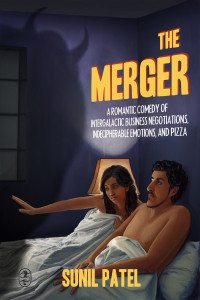
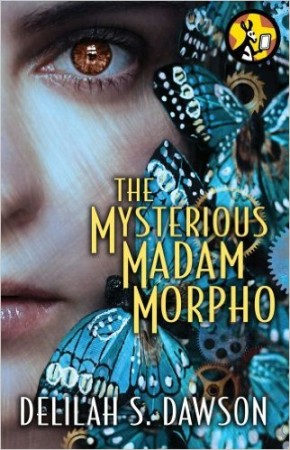
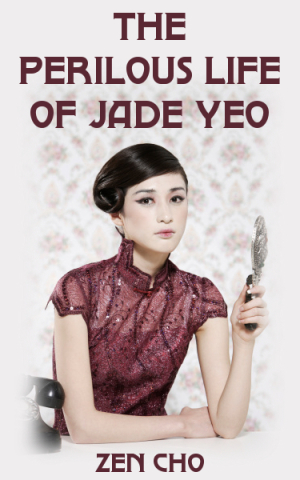
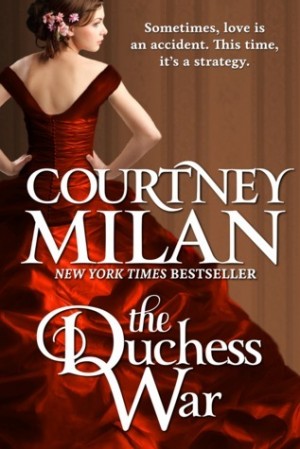
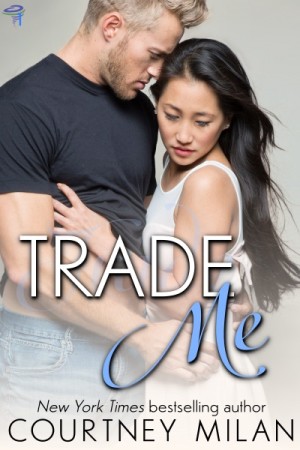
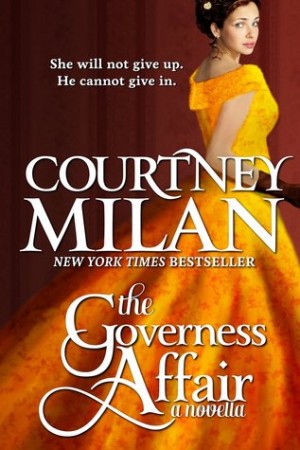
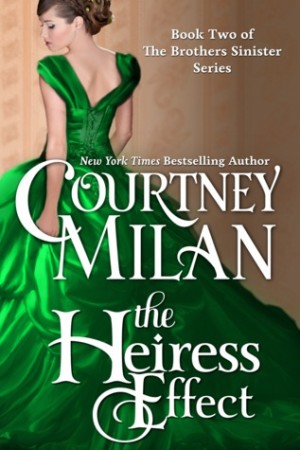
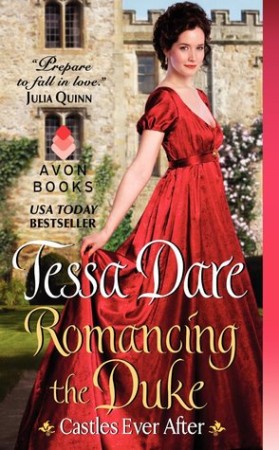









27 Comments
Jenny @ Reading the End
December 23, 2015 at 10:34 amAw, I love this post! You’ve also perfectly captured everything I love about Courtney Milan (and all my favorite romance novel authors).
Gerd D.
December 23, 2015 at 10:40 am“These two very specific people with very specific histories and character traits want to bone, and they complement each other in beautiful ways, and they acknowledge and respect each other’s flaws, and they fill each other’s holes emotionally and also did I mention the boning.”
-Okay, that part just made my imagination go to a scary place, nothing wrong with people filling each others holes, much, I guess… but yuck!
So yeah, this whole focusing a story on sex… am still not sold towards Romance, that part of it at least, as a genre. Not saying that there aren’t some writers that can write sex scenes and still deliver romance.
Christine D.
December 23, 2015 at 11:05 amGerd D., I’d say that sex is just a small component of romance. It’s not the focus. If it’s entirely the focus, it’s labeled as erotica instead. Some romance novels don’t even have written sex scenes, and just do a fade-to-black.
Courtney Milan’s books are just as interested in politics, historical context, male and female friendships, power dynamics, expectations of society, inner lives vs. outer shows, etc., as they are about anything romantic. It’s like saying that SFF is all about lasers and swords.
Kat T.
December 23, 2015 at 11:15 amNice post! I totally agree with the Tessa Dare recommendation. Courtney Milan is one of my all time favorites. Since you also like Sci-Fi and Fantasy, you might want to try the Last Hour of Gann by R. Lee Smith. It’s one of the best.
And yes, Romance novels are not just about the sex. They’re so much more than that.
Gerd D.
December 23, 2015 at 12:37 pm“It’s like saying that SFF is all about lasers and swords.”
Some certainly is. 🙂
Haven’t read any Courtney Milan, so I can’t say anything about where she falls in the genre, but most Historical Romance I picked up turned out to be just a sub-genre of Erotica, more interested in detailing the characters carnal longings.
Again, nothing wrong with that if this is what a reader is looking for, it’s just not what I expect from it.
de Pizan
December 23, 2015 at 1:54 pmI’ve really wanted to give romance a try because I hated writing off a whole genre, especially one mostly written by women for women; but for the most part I have not had much luck (I will say that being asexual, I may just have to realize that it’s not really for me). Even with recommendations from sites like Smart B*tches, I was still winding up with books with a lot of alphahole heroes and situations or relationships that struck me as really problematic. Anyway, all that aside, I did just read The Captive by Grace Burrowes, and really enjoyed it. There were still one or two tiny issues, but it was, so far, the best romance novel I’ve read. A caveat though, it’s about two people trying to overcome horrible things–the hero was tortured and held captive for months in the Napoleonic wars, the heroine was married to an abuser; so definite trigger warnings. I felt that for the most part, it was handled really well and there wasn’t any minimizing the PTSD or trauma that these characters would have, and they weren’t magically healed the second they found True Love. (Despite the heavy themes, I didn’t feel like it was a depressing book.)
Ridley
December 23, 2015 at 1:57 pmOut of curiosity, does SFF get a lot of “I assumed your favorite genre was all spaceships and slave girls but now I know better!” articles?
Stan
December 23, 2015 at 9:11 pmEverything in this post could also be said of Clare Austin’s work. Try the wonderful Fado Trilogy (each novel also reads well as a standalone) or the funny, poignant, and insightful Hot Flash.
Cathy
December 23, 2015 at 11:47 pmI will have to check out some of these, but I’ve been pretty happy with the J. D. Robb / Nora Roberts books I’ve read. The “In Death” series, published under the Robb pseudo, are near-ish future police procedural romances. The Roberts books I’ve read so far are contemporaries, with a dash of mystery or some other plotting. They’re a lot of fun!
Katy
December 24, 2015 at 8:11 pmUgh ugh ugh. By focusing on one romance author, he’s basically touting her as the exception to the “badly written heaving busoms”. By saying “golly, the sex wasn’t just for titillation!” he’s implying that reading about sex for titillation is somehow wrong or gross (hello, erotica? Valid genre! Plenty of them are spectacularly written!).
I’m so sick of these “pat myself on the back” essays about “I tried romance and it’s not all yucky!” Dude, you might mean well, but imagine if someone had written an article titled “How I made friends with a black person and you should too! Spoiler: They’re not all illiterate thugs!”
Weekend Links: December 26, 2015 | SF Bluestocking
December 26, 2015 at 5:46 pm[…] At The Book Smugglers, Sunil Patel writes about his first foray into reading romance novels. […]
Kas
December 27, 2015 at 1:11 pmLove this post! I’ve been renewing my own love for romance novels and I find I agree with Sunil Patel–romance novels provide some awesome female characters and male characters who show respect for women. I’m falling in love. I’ve been following Sunil Patel on Twitter for a while and adding his recommendations to my to-be-read list (which reminds me i need to seek out his writings, as well–gotta love all the fellow theater nerds out there!).
Reading through the comments, I understand the flak this article is getting but as a twitter follower, I took from this not a “here are some exceptions to the genre” so much as “this is just the start of my exploration and I’m loving it.” Not to say that the criticisms don’t have a point, just that the article put in context with his tweets show the depth to which Sunil Patel does indeed have a respect for the genre–but my opinion may have been different were I to come to read the article alone.
Tansy Rayner Roberts
December 28, 2015 at 5:11 pmSunil, if you enjoy Courtney Milan and Tessa Dare (who were at the forefront of my own journey into romance fiction last year) then the next author to pick up is Sarah Maclean, who has a similar balance of complexity, witty banter and sex-as-character-growth.
Jeannie Lin’s Chinese historical romances are also fantastic.
Tonya Moore
January 3, 2016 at 7:22 pmIt’s been years since I last read a romance novel. I used to enjoy them so much, especially historical romances. I’m sure I didn’t stop reading them out of disdain for the genre. Rather, I got preoccupied with SciFi and just sort of lost touch with them. I should definitely start reading them again. There are so many authors mentioned here, whose work I’ve missed out on over the years. Time for some catching up, I think.
2015 Reading Year in Review: Romances | From My Wandering Mind
January 6, 2016 at 11:12 am[…] year I was following Sunil Patel’s* call for romance recommendations on Twitter, (read about his experiences with venturing into the romance genre here) and saw all the recommendations for Courtney Milan. As it happened, she was just releasing her […]
Art, meanderings, and briefly on reading | Genre-bending
January 8, 2016 at 8:23 pm[…] Rising by Timothy Zahn). Incidentally, if you are a dude and you are wary of romance novels, read this delightful article by Sunil Patel. And then go read some romance […]
lazy sunday – Katharine Schellman
January 10, 2016 at 10:06 am[…] yes, thank you, finally! […]
Romance By Any Other Name - Full of Words
January 19, 2016 at 1:26 pm[…] now, I’m going to follow Sunil Patel’s lead and pick up a book by Courtney Milan. His article over at The Book Smugglers makes a compelling case for why guys should give romance novels a chance. It’s kind of […]
2015 Awards Eligibility Post - Sunil Patel
January 28, 2016 at 7:26 pm[…] I am also eligible for Best Fan Writer thanks to my Twitter. And a couple blog posts like “What Sunil Patel Learned About Writing from John Wick and Mad Max: Fury Road“ and “I Read a Bunch of Romance Novels and You Should Too.” […]
A rebuttal of sorts | Blow Pop's Book Reviews
February 18, 2016 at 5:37 pm[…] fact, I identify a LOT with this article. Not all of it mind, but a lot of […]
Christina Vasilevski
March 27, 2016 at 3:26 pmOh my god! I remember reading *about* “Trade Me” earlier this year, and mentally filed the book away – but forgot the title. I had been wracking my brain for ages to remember what it was called, so thank you!
What I'm Nominating for the 2016 Hugo Awards - Books and Tea
March 29, 2016 at 10:03 am[…] Sunil Patel — I mostly follow him on Twitter, but I also have liked his essays on The Book Smugglers. […]